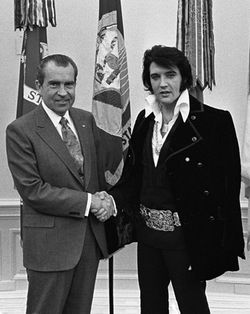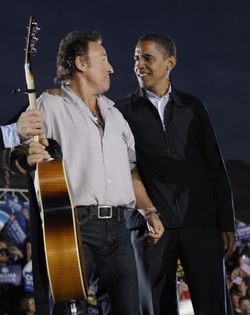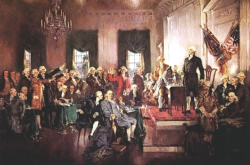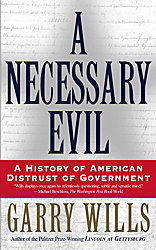Think of this as Volume 12, Number 33 of A-Clue.com, the online newsletter I've written since 1997. Enjoy.

There is a natural dysfunction to a political balance. The minority acts like an abused spouse, alternately screaming in impotent rage or crouching low, ready to be hit. Liberals have been in this crouch for a generation, ever since the Nixon-Wallace coalition ushered in the Nixon Thesis of Conflict.
This thesis has been especially hard because, as noted, it is based on conflict, on bullying, on disrespecting the opposition as illegitimate, an intractable "other." Those who abandon the Thesis are traitors, no matter their past contributions. This Thesis had its apotheosis during the Bush years, where the right's foot soldiers were allowed to become like the hippies of 40 years ago — haties I call 'em — intimidating their opponents, shouting them down, forcing them off the political stage through their own triumph of the will.
Every new Thesis faces this type of battle with the past. Confederates. Populists. The Rich. The Hippies. It took a Great War for Lincoln to beat his enemies, Teddy Roosevelt co-opted populism, FDR used the media and Nixon used scorn — his "nattering nabobs of negativism."

At Netroots Nation this week in Pittsburgh, liberals will demand that the President banish these people, that he pass health reform on a party-line vote, that he attack the Right as Nixon attacked the Left. This runs counter to the President's temperament. It runs counter to his own political assumptions.
But a line has to be drawn. Question is, where do you draw it? And how do you draw it, so that people on both sides know where that line is, and know that leaving the consensus in front of that line is crossing a Rubicon from which they can never return?
This task will define President Obama, his coalition, his Administration, and the next generation. It's the most important work of his life. When do your words or actions rule you outside normal politics, beyond the "mainstream," out of bounds? How do we set a rule whereby we know and accept those boundaries? Because right now there is no boundary.
Without boundaries you have anarchy. This is the real opposite of government, not freedom but anarchy. The law of the gun, control by the strong, submission of the minority where possible and the majority where necessary. Whether it's a dictatorship of Doctrine, or of Money, or of the military, it's still a dictatorship.
The fate of Latin America for 200 years, in other words, is ours if Obama fails. The iron triangle of Church, Soldier, and Moneyman has had Mexico in its thrall since its founding, never mind the rhetoric, and the results are plain to see. Without consensus you have the law of the gun. Unless the people are willing to put their lives on the line to protect a system of ordered liberty, there is only disorder. Leave government to any elite and this is the inevitable result.

These are the lessons Professor Obama needs to teach, now, in clear and unmistakable language. These are lessons most Americans have always unconsciously accepted. It is our faith that, in the end, democracy will win out, that the majority will always respect the legitimate rights of the minority, but in the end the majority must have the day.

Most Americans understand this, or wish to. We want to believe that our government is strong enough to meet the challenges of our time, that our system is not a suicide path, that a way forward is possible. This is the majority view.
But once a minority becomes a majority it can also become silent. We have been pushing that rock uphill for so long, and now we've won, and now we're tired, and can't we just rest here a while?
No, we can't. Elections hold out only the hope that your dreams for the nation will be realized. It still takes courage, and active participation, to see that the job is done.
Richard Nixon and his speechwriters summed this up in November, 1969, with what came to be known as the Silent Majority speech. The phrase was used just once, and not capitalized. But the message of the speech on Vietnam was identical to what this President must say about health care, about climate change, about financial reform. "As President I hold the responsibility for choosing the best path to that goal and then leading the Nation along it."
We won. You can disagree. But if you obstruct the work before us, in word or in deed, we who are the new majority will reject you, we will reject you today, tomorrow and forever.

The New Majority must now be heard, through the words of the President, and the Vice President, and his Administration. The time has come to lay down the ground rules for our new debate, our new balance of political forces. And to enforce those rules against anyone who violates them.










